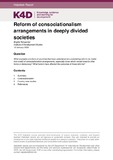| dc.contributor.author | Rohwerder, Brigitte | |
| dc.date.accessioned | 2020-02-04T17:06:32Z | |
| dc.date.available | 2020-02-04T17:06:32Z | |
| dc.date.issued | 2020-01-13 | |
| dc.identifier.citation | Rohwerder, B. (2020). Reform of consociationalism arrangements. K4D Helpdesk Report 730. Brighton, UK: Institute of Development Studies. | en |
| dc.identifier.uri | https://opendocs.ids.ac.uk/opendocs/handle/20.500.12413/15000 | |
| dc.description.abstract | Consociationalism arrangements, a form of power-sharing, have been used in violently divided societies as a means to end wars and build peace. However, many deeply divided countries have struggled to implement their power-sharing arrangements and the transition to more ‘normal’ politics is difficult. Research into reform of consociationalism arrangements in deeply divided societies is scarce and there is little focus or detail provided about the factors which affect the outcomes of these reforms. The few papers found on the subject are from academic sources. This review synthesises literature on the examples of countries undertaken or are undertaking reform of consociationalism arrangements, especially those which moved towards other forms of democracy. The first section of this report elaborates the term consociationalism and its four key institutional arrangements outlined by Lijphart, the the leading authority on consociationalism: executive power-sharing (grand coalitions representing different societal groups); proportionality rules in political representation; mutual vetoes, allowing communities to contest decisions against their interests; and group autonomy, or right to run their own affairs. The second section of this report outlines several case studies of peace agreement consociationalism arrangements in Northern Ireland, Bosnia and Herzegovina, Lebanon, and Burundi which illustrate the various pathways away from consociationalism arrangements. None of these deeply divided countries has made a full democratic transition away from consociationalism yet, but reforms (and attempts at reforms) have been made to their consociationalism arrangements. | en |
| dc.language.iso | en | en |
| dc.publisher | IDS | en |
| dc.relation.ispartofseries | K4D Helpdesk Report;730 | |
| dc.rights.uri | https://www.nationalarchives.gov.uk/doc/open-government-licence/version/3/ | en |
| dc.subject | Governance | en |
| dc.subject | Participation | en |
| dc.subject | Politics and Power | en |
| dc.title | Reform of Consociationalism Arrangements in Deeply Divided Societies | en |
| dc.type | Helpdesk | en |
| dc.rights.holder | © DFID - Crown copyright 2020 | en |
| dcterms.dateAccepted | 2020-01-13 | |
| rioxxterms.funder | Department for International Development, UK Government | en |
| rioxxterms.identifier.project | K4D | en |
| rioxxterms.version | VoR | en |
| rioxxterms.funder.project | 238a9fa4-fe4a-4380-996b-995f33607ba0 | en |

